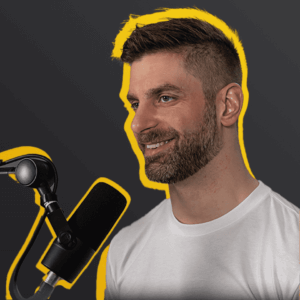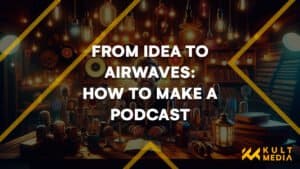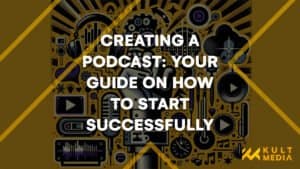Welcome to the KULT Kreator Experience, successful content creation to build powerful connections, a podcast designed to help passionate experts and entrepreneurs launch a podcasting platform, successfully build a following and become industry leaders.
Hi, I’m Matt and I’m the founder of KULT Media and the host of this podcast. I’ll be sharing my experience and insights from over 15 years of content creation, and along the way, I’ll be seeking out other KULT Kreators to learn from their wisdom and expertise.
So far, we have unpacked the Profit Pillars of Podcasting, the personal side of becoming a creator, how to define and find your audience, and what your podcasting product could look like.
And in today’s episode, we move into the next step of my KULT Kreator Experience, Create. The Create step is all about how to produce your content. And our first phase of Create is pre production for podcasts. I’m going to share the significance of good pre production, how to build your brand, how to prepare for your first podcast episode and how to create your launch strategy.
But before we prime your podcast for launch, please take a second to follow us on Instagram @kult.media and on your podcasting app of choice.
The Power Of Podcast Pre Production
To start this phase of the KULT Kreator Experience, I want to emphasize how powerful pre production for podcasts can be.
Every TV show, branded content and film I’ve ever worked on, has revealed that the amount of stress, confusion, mistakes and expense is directly correlated to the quality of the pre production. Content that lacked attention to detail in pre production would use more resources of time, money and energy, compared to those with watertight plans, realistic expectations and crystal clear communication.
Pre-production for me is summed up in a couple of expressions. The first one comes from the military: “proper planning and preparation prevents piss-poor performance”. And the other is from Benjamin Franklin: “fail to prepare, prepare to fail”.
And these ring so true with content creation. You increase the risk of costly mistakes by not having a good pre-production process.
Let me give you some observations from across my career that are components of great pre-production. The first one is about location. In TV and film, the location of a scene or a shot is really important. The directors or producers want good light, a nice balance of colour, interesting surroundings, but not too distracting, and for the environment to add to the story. Being involved from the start in the criteria for the perfect location can save an otherwise difficult scene for post-production. We would speak to producers and give them guidelines that would affect the later editing process.
For an audio recording session, this would be trying to be free of extraneous background noise from traffic, construction, and air conditioning, and for video, it’d be the under-use of light to cause the shots to look blurry or dull.
Now, how is this relevant to podcasting? Well, by planning beyond the act of simply capturing the recording, we are better able to improve the whole process, saving time, money, and ultimately stress. This recording location example is the most common issue when it comes to editing and producing a great sounding podcast.
Location
Where will you be recording? What does that space look like? And how long will you be there and who else is involved? Will there be guests? All of these questions can be answered long before you press the big red button, and can completely change the overall quality of production.
An example is recording your podcast in a shared meeting room, maybe in your WeWork or shared office space. Now, the recording environment is probably not ideal, there might be glass walls or completely untreated walls, lots of windows, and loads of reflective surfaces. Not great for the sound of your podcast. Then, you might want to be doing the batch recording. This is time-dependent. Will you be able to hire or book that room for the time you need?
Then there’s the use of pickups. You might record your guest interviews all in one go, and then you might need to do your intros and outros at a later date. If you can’t access the same recording space, your audio will sound different.
And of course, if you’re producing a video podcast, the environment needs to be a perfect balance of acoustically suitable and aesthetically-pleasing.
Scripting / Story Boarding / Paper Edit
Another powerful and podcast-enhancing piece of pre-production is scripting, also known as storyboarding or paper editing. For now, I’m just going to call it scripting for ease. A trick I’ve noticed amongst great producers and journalists is the use of scripting beyond just basic research. Now, this isn’t the precise preparation of every detail of the spoken word, but more planning of how all of the elements of production all come together based on the facts currently available.
For example, when booking guests for a show, they’ll do basic research. They’ll head to Google, visit websites, read articles and consume all related media. From there, they will build a script of how the interview might go. They can theorize about what might be said by the guest, how it fits their narrative, how long it might take, and even where the recording session will happen.
They can attempt to map out the whole process to make it as easy as possible for all involved. So building a good body of research, creating a production roadmap and preparing scripts, storyboards and paper edits, are the best way to control the variables and reduce the risk of mistakes.
I’ll share a quick TV horror story from a few years ago, that highlights the importance of storyboarding or scripting.
When the UK still had troops out in Afghanistan, there was a field hospital that was selected to be filmed for a TV documentary. The film crew went out for a month or so to document the experience of those in this temporary medical outpost. Temporary, as in not in a permanent building. It was like a giant tent in the middle of nowhere.
They shot the action, the operations, the doctors, the surgeons, and the staff saving lives, and the people affected by the war. They gave a rare insight into the reality of a conflict zone. They got some incredible footage, but it would never be seen again. Why? Well, after weeks of filming and interviewing all of the action inside, the creators had forgotten to film the outside and the building itself. And the doc was about this field hospital and how unique it was, and yet it got forgotten. And there was no opportunity to return and film the exteriors because the unit had been dismantled and removed. And I still don’t know to this day, whatever happened to that show, or even if it got edited at all.
“Proper planning and preparation prevent piss-poor performance, and that rings so true in this example.”
Budget
The third and final key point to the power of pre-production is the all-important budget. Financial budgets and budgeting for time. By understanding our vision for our podcast, we can start to build a budget for all the necessary resources. I’ve said this before, but I believe the process for content creation is circular.
We should identify how we want to profit, and what success looks like, then establish our identity and goals, find our audience, design a solution, prepare that solution, create and finesse the solution, and then deliver and promote it.
And then we go back to measure against our determinants of success to see if we’re achieving our objectives. We review and start the cycle again, whether it be by episode, series or project.
So the process is not linear, which means our budgets for time and money need to look beyond the production of an individual podcast episode. We need to consider the costs from market research to marketing. And it is in the pre-production phase that we should seek to make the best choices for the longevity of our show. And stats show that most podcasts don’t make it beyond episode eight.
And I think together we can change that statistic. So there is no point in purchasing a thousand-dollar microphone, an $800 mixer, $500 of stands, cable, or software, if it destroys your budget. It also makes zero sense to invest 50+ hours a week researching the best tech. It would be a wasted opportunity to develop your podcast into something awesome.
So instead of all the budget going on your tech, split it into production, post-production and promotion. And share your time across the entire podcast strategy. Pre-production, production, post-production, publishing, promotion, and that all-important profiting.
And this is a great opportunity for me to share an optimal podcasting hack, that being, batching. Preparing your time and financial budgets to allow you to get ahead will really benefit you. It can reduce stress, it allows guests to reschedule and it can get you months of content, ready to go ahead of time. Seek to prepare multiple recordings in a block, and then have that batch-edited and then have the marketing all batched together, and then schedule it to release over time.
And that might seem like a lot to do, but with good pre-production, you can break it down into checklists or workflows. This might expose a time deficit, and this can help you establish what you need to outsource to podcast production services. So that is the wonder of pre-production. It’s powerful stuff, right?
Building A Brand
The next item to discuss in the pre-production phase is the concept of brand building. I know that we touched on this before, but I want to hit it again from a pre-production point of view. I’m going to share a little quote with you first.
“A brand is the way a product, company or individual is perceived by those experiencing it. Much more than just a name or a logo, a brand is the recognizable feeling these assets evoke.” And that’s from ignytebrands.com.
So how does this relate to the average podcaster? Quite often, it doesn’t, but we aren’t average podcasters. We are here to help others, to make the world a better place and to be the best we can be. So in that case, branding matters to us as podcasters. It’s about emotion and recognition. And this can be simplified down to your purpose and presentation.
When you are creating content, ask yourself, does this align with my purpose and vision, and how easy is it for others to understand my objectives and values through my content?
A really simple example of this is the consistency of typography, iconography, imagery, colours and language, across all of your content, allowing your followers to quickly identify your brand and invoke that emotional connection. Another example of this could be how your podcast identity sits in your existing or business brand.
When engaging with your ideal listener, are they speaking to your business? Are they speaking to the podcast as an entity in its own right? Or are they speaking to you as an individual?
A good podcast case study could be the Football Weekly podcast, which is made by The Guardian and hosted by Max Rushton. When the audience engages, they engage the show, they are speaking to the podcast production directly and not to Max or The Guardian.
And you have to make that choice when you’re setting up your podcast.
Alternatively, when you get in touch with this podcast, you’re talking to me directly as host and as the founder of KULT Media. My personal brand and my business are all currently linked. So consider purpose, presentation and how you’re utilising your content marketing for your business or brand.
And if you have a brand, how does the podcast fit into it? Are people going to hear your podcast and call your business, or are they going to email the podcast, the show itself? And if you’re creating a new brand, do you have guidelines in place to ensure there is consistency, especially if you start to outsource?
Preparing For Your 1st Podcast
As I mentioned, pre-production is a significant phase. There is a lot to consider, but the choices you make here will save you time and energy further down the road.
The key consideration most people associate with pre-production is planning your episode out. So let’s do that. And like most things we need a beginning, a middle and an end. And in podcasting, this could be our intro, the body content and then the outro.
For me, I map out all the possible elements in each section of my production. Once I have this show outline or running order, I can refer back to my initial budget and plan, to make sure it’s all possible. So what elements am I considering when I’m creating a show running order? These could include the host intro if it’s a solo show, the host body content and the host outro.
We could have music. We could have professional VO, we could have sound design, and we could consider contributors, whether they be listeners or people we’ve specifically sourced. We might have stings or idents, and these are known as um, imaging in radio terms. We could have adverts, we could have show rituals, which might be a block of questions you have or a game you play in every show.
You could have acknowledgements where you say thank you to things if it’s not already part of a sponsorship. You could have just an interview or stories or segments if you’re building a documentary or a magazine show. Or it could just be the whole of a scene if you’re creating something drama-based or fiction-based.
Once I’ve chosen all the elements of my podcast production process, I can write the running order and plan all the resources I need to produce it. It might transpire that it’s too difficult for me to maybe have the audience participation or phone-in section or that actually, I need more music or sound design or idents to help my podcasts move along.
So, which of the elements mentioned are you hoping to have in your podcast?
Defining Your Podcast Launch Strategy
Start with the end in mind. We hear that phrase a lot regarding creative and business processes, and it’s true to form here too. Once we have made our plan to produce, we should pause for a moment to then consider the publish and promote phase of our podcasting. Don’t immediately rush into recording that first episode just yet.
We want to launch with a bang, but we also don’t want to fade away after launch, so take this moment to prepare.
A good podcasting launch strategy is really similar to film and TV, in terms of marketing. We want to drum up interest, and intrigue and make it as easy as possible for the potential audience to find the content when it goes live.
And once we are launched, the launch strategy could be repurposed and scaled back to become your podcast marketing strategy in the future.
I split my launch strategy into four segments. Before, which is an unspecified time. I’ll leave that up to you and your production. The week before, the week of launch, and then after launch. I’m going to share with you some of the things you might have in each section, but this is by no means inclusive of everything you could possibly do.
So, what kinds of things would we find in the before a segment of your launch strategy? A lot of the stuff we’ve done in the first few episodes, finding your ideal audience and engaging with them, joining networking groups, Facebook groups, making sure you’ve got enough time to engage with those people, sharing your idea with some of your followers or some of your existing audience or some of your potential audience.
Recording three to five shows, editing those three to five shows. Designing your artwork, creating compelling calls to action, connecting your website to Google Analytics so you can see where people are coming from or Facebook pixels. Preparing a podcast trailer, is pretty important, and a great way to test if your host is operational. Put that trailer on there, give it all tests, and make sure the pipes are working.
You might be promoting already, just off some graphic design that you have about your podcast. And let’s move into the, uh, into the week before. The week before your podcast launches, you might be emailing people on your waitlist, if you’ve got one or if you’ve already got a marketing list.
You might be creating some audiograms with some promo content. You’ll be sending the trailers out to people to co-promote. You’ll be making sure the show notes are all ready for those first few episodes, and you’ll be letting people know when the show goes live.
In fact, you might even prepare to do a Facebook live on the same day, it’s entirely up to you.
And then launch day. On the launch day, you need to publish the podcast. Just make sure you do that as a bare minimum, right? Make sure all the podcast show notes are available, transcriptions if you want them. Email that waitlist again, to let them know it’s live now and then try and get some people to give you some feedback as quickly as possible on that launch day. Create that buzz.
And then the week after launch, when this becomes a sort of steady uh, marketing strategy beyond launch, you want to thank everyone that’s helped you launch it. You want to get more people on your subscriber list, so you want to be sending out those, thanks for joining emails. You want to be doing acknowledgements. You might be doing some bonus content to talk about the hype and excitement of your launch, and you want to be teasing future episodes.
And that are just a few ideas. And if you need a hand developing your launch strategy, please drop me a line and we can chat about what your podcasts might need prior to the big day.
And as I have mentioned, this process is not linear, and we are definitely touching on phases of the KULT Kreator Experience we haven’t discussed yet. But this shows the importance of effective pre-production.
We should be considering what we might need to support the podcast when we publish and promote it. And this will definitely have an effect on what you produce. You might make the shows shorter to allow for more time for marketing, or you might choose to create extra content to support the promotional strategy. And in some examples of this in radio, they get the artist to say something promotional after they’ve guested or been interviewed by a show. The radio station then cut these into trailers and idents.
On TV, if we look at the BBC Natural History shows like David Attenborough’s Blue Planet or Life on Our Planet, they have an additional crew and resources to produce behind-the-scenes footage to go in the show, but also online and to help them produce other content.
And in film, we’ve all seen the billboards, the trailers, the scene lifts alongside huge promotional tours with the stars of the feature. And these can all be planned and budgeted for before they shoot a single scene.
So I hope that this episode has been both informative and helped you prepare your podcast to be a leader in your industry or niche. We have covered the power of pre-production, clarifying key decisions that can affect your podcast creation and preparing with scripts and budgeting.
I shared my thoughts on building a podcast into a brand. We outlined our first podcast plan or running order, and we looked into considerations for your podcast launch strategy to look beyond the recording sessions alone.
I find that a modern entrepreneurial Start Now Fix it Later sentiment is great for taking action. But I strongly believe that pre-production doesn’t cost much and can save you massive amounts of time, money and stress later in your KULT Kreator Experience.
So, what does your podcast plan look like? Do you have that existing brand that your podcast needs to fit into or is it completely new and you need guidelines?
What does your average episode look like? And how and when will you launch your podcast into the big wide world? Drop me a message on Facebook or Instagram to share your ideas with me, and I’ll do my best to move you on to the next phase of production.
And I’d like to thank you for listening and being part of the KULT Kreator Experience, and I am always happy to get feedback. And if you have any questions or topics you’d like me to discuss, please reach out to me.
And if you want to start your own KULT Kreator Experience and become a KULT leader in your industry, head to www.kult.media to get your free strategy session.
And until next time, be good!












